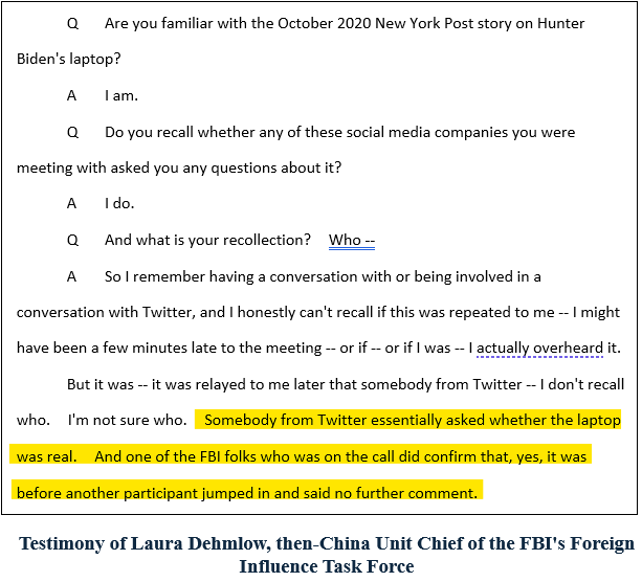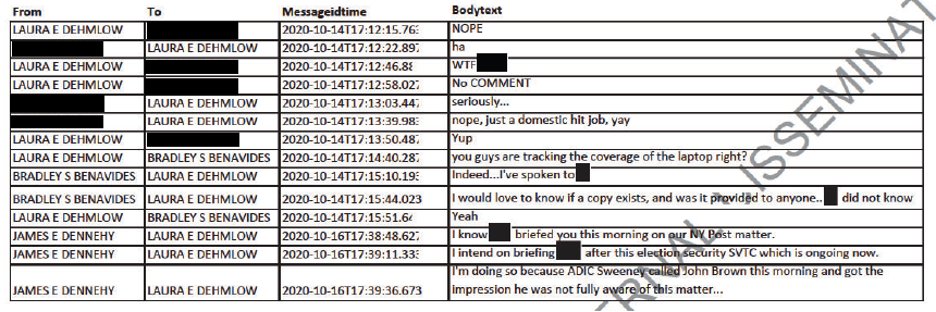BREAKING: Internal FBI Chat Logs Expose Agency’s Suppression of Hunter Biden Laptop Story During 2020 Election
The release of newly obtained FBI internal chat logs has sent shockwaves through Washington, revealing the agency’s active role in suppressing information regarding the infamous Hunter Biden laptop story. These newly surfaced communications show that the FBI, on the very day the New York Post published its bombshell report in October 2020, worked to downplay and discredit the story that involved potentially incriminating details about the Biden family’s overseas business dealings.
The House Judiciary Committee, in its latest release on Tuesday, made these documents public, showing a concerted effort by senior FBI officials to silence any discussions about the laptop’s contents, even as an FBI analyst attempted to confirm its authenticity with the social media platform that was known as Twitter at the time. The information raises serious questions about the role of federal agencies in potentially influencing the 2020 presidential election.
The FBI’s Role in Suppressing the Hunter Biden Laptop Story
The chat logs, obtained by the House Judiciary Committee, provide a window into the inner workings of the FBI at a pivotal moment in U.S. history. On October 14, 2020, the New York Post broke the story about Hunter Biden’s laptop, which contained emails and other documents suggesting that the Biden family had been involved in questionable foreign business dealings. Despite having possession of the laptop for nearly a year by that point, the FBI failed to publicly confirm its authenticity. Instead, the agency appeared to work behind the scenes to discredit the story, which became a major issue in the final weeks of the presidential campaign.
One message from the FBI’s internal chat logs, sent on the same day the story was published, instructed agents to “Please do not discuss Biden matter.” This directive was issued even as the FBI had already confirmed the authenticity of the laptop. However, rather than providing this information to the public or the media, the agency appears to have misled social media companies and the American public by portraying the story as Russian disinformation. This led platforms like Twitter to suppress the story, limiting its reach and impact during a critical moment in the election cycle.
FBI Analyst’s Attempt to Confirm the Laptop’s Authenticity
The chat logs also reveal that, on the same day the story broke, an FBI analyst attempted to confirm the laptop’s authenticity to a representative from Twitter. Despite the analyst’s efforts to be transparent and provide accurate information, they were met with resistance from other FBI officials.
In testimony before Congress, Laura Dehmlow, who was the head of the FBI’s China Unit within its Foreign Influence Task Force at the time, confirmed that an FBI agent had acknowledged the laptop’s legitimacy. “Somebody from Twitter essentially asked whether the laptop was real,” Dehmlow recalled. “And one of the FBI folks did confirm that, yes, it was real, before another participant jumped in and said no further comment.”
This brief but telling moment highlights the tension within the FBI between agents who wanted to confirm the truth and others who sought to prevent any public acknowledgment of the laptop’s authenticity. According to the logs, the analyst who confirmed the laptop’s legitimacy was reprimanded and even allegedly told to “shut up” by senior officials. This crackdown on transparency points to a deliberate effort to withhold information from the public at a critical moment.
FBI’s Efforts to Stifle the Story
The chat logs also include messages that shed light on the FBI’s internal discussions about the story. Senior FBI officials appeared to make light of the situation, with one sarcastically commenting, “NOPE… just a domestic hit job, yay.” This comment came shortly after the New York Post’s report was published, indicating that some within the FBI viewed the situation as a political maneuver rather than a legitimate investigative issue. Another official remarked, “You guys are tracking the coverage of the laptop, right?” suggesting that the agency was closely monitoring the media’s response to the story.
The internal communications indicate that the FBI’s actions were not just a matter of suppressing information but of actively controlling the narrative. One response in the chat logs read, “Tried to thread a smallll needle there,” further implying that the agency was trying to manage the situation delicately to avoid drawing attention to the laptop’s authenticity while also preventing any confirmation that might harm the political landscape.
Tech Companies and Their Role in the Censorship of the Story
The FBI’s influence over the media was not limited to internal communications. Tech companies, particularly social media platforms like Twitter, were heavily involved in suppressing the story based on the FBI’s guidance. Internal communications from Facebook, released last year, revealed that executives at the company were discussing the possibility of suppressing the New York Post story to “calibrate” favor with the incoming Biden administration. These revelations have sparked widespread concern over the role of Big Tech in influencing political discourse during the election cycle.
The actions of both the FBI and social media platforms are particularly troubling given the timing of the suppression. As more than 30 million Americans were casting their votes in the weeks leading up to the election, the story about Hunter Biden’s laptop—which contained evidence suggesting corruption and potential conflicts of interest—was buried under the pretext of Russian disinformation. This censorship may have affected the public’s ability to make informed decisions during one of the most contentious elections in modern history.
The Significance of the Laptop and the Evidence it Contained
The Hunter Biden laptop, which was originally turned over to the FBI by Delaware repairman John Paul Mac Isaac in December 2019, had already been authenticated long before the New York Post’s story broke. Yet, the FBI continued to withhold confirmation of its authenticity, allowing the narrative of the laptop as Russian disinformation to persist.
The contents of the laptop included emails and documents that suggested Hunter Biden’s involvement in foreign business dealings, particularly in Ukraine and China, that could implicate his father, Joe Biden, in unethical or even illegal activities. The decision to suppress this story raises important questions about the transparency and accountability of federal agencies in the context of a national election.
According to the Judiciary Committee’s interim report, the FBI’s actions amounted to direct interference in the 2020 election. “While the FBI eventually conceded that it had no indication the allegations in the Post story were Russian disinformation,” the report states, “the FBI still withheld the fact that it had seized and authenticated Hunter Biden’s laptop months prior.” This delayed acknowledgment of the laptop’s authenticity speaks to the broader issue of government agencies potentially influencing election outcomes by controlling the flow of information.
The Impact on the 2020 Election
The suppression of the Hunter Biden laptop story by the FBI and Big Tech companies raises serious concerns about the role of information warfare in modern elections. The censorship of a story involving a major political figure’s family—especially one that suggested potential corruption—has profound implications for the integrity of the democratic process.
While the FBI eventually admitted that it had no evidence to suggest the laptop was linked to Russian disinformation, the damage had already been done. The suppression of the story by social media platforms effectively silenced a major story just weeks before the election, preventing voters from having access to potentially damaging information about one of the leading candidates.
The revelations from the House Judiciary Committee’s investigation suggest that the FBI’s actions were not just an oversight but part of a coordinated effort to influence public opinion in the run-up to the election. The FBI’s failure to act transparently on the Hunter Biden laptop case raises fundamental questions about the role of federal agencies in the political process and the ability of voters to make informed decisions.
Conclusion: A Call for Accountability
The release of the FBI’s internal chat logs has ignited a firestorm of debate in Washington and beyond. As the details of the FBI’s suppression of the Hunter Biden laptop story continue to unfold, it becomes increasingly clear that the agency’s actions were not just about managing an investigation but about controlling the narrative during a critical period in U.S. history.
The implications of these revelations are vast. They speak to the need for greater transparency and accountability in how federal agencies handle politically sensitive information. They also highlight the significant role that Big Tech companies play in shaping political discourse and influencing public opinion.
As the investigation continues, it remains to be seen whether those involved in the suppression of the Hunter Biden laptop story will face any consequences. What is clear, however, is that the American public deserves to know the truth about what happened during the 2020 election—and the steps that need to be taken to ensure that such interference does not occur again in the future.

Adrian Hawthorne is a celebrated author and dedicated archivist who finds inspiration in the hidden stories of the past. Educated at Oxford, he now works at the National Archives, where preserving history fuels his evocative writing. Balancing archival precision with creative storytelling, Adrian founded the Hawthorne Institute of Literary Arts to mentor emerging writers and honor the timeless art of narrative.


